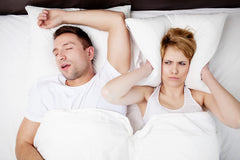A good night’s sleep provides you with many benefits, including refreshing you for the next day and assisting in your body’s restorative process. Not getting enough sleep, however, such as in the instance of insomnia, anxiety or depression, can have far greater repercussions.
A study conducted in Norway has determined a link between adults 20 years old and older and who have trouble sleeping and an increased risk of suicide. Close to 75,000 adults took part in the study, which concluded that sleeping problems can contribute to an elevated risk of suicide. A whopping 31% of those surveyed reported “sometimes” having trouble maintaining a healthy sleep pattern, while 5% reported “often” having trouble getting a good night’s sleep. During the follow-up, researchers discovered that 188 of study participants had committed suicide.
The risk is not particularly higher in one gender or the other, but the link between suicidal behavior and sleep patterns is stronger in those who are 50 years old or younger. The study also concluded that those who had the worst documented sleeping patterns doubled their risk of suicide.
 If you’re currently struggling to maintain a healthy sleep pattern, or if your sleep disturbances are made worse by struggling to breathe or wrestling with a sleep disorder, My CPAP Club can help. Offering a variety of sleep solutions for customers anywhere in the U.S., we can help you get the good night’s rest you have been wanting.
If you’re currently struggling to maintain a healthy sleep pattern, or if your sleep disturbances are made worse by struggling to breathe or wrestling with a sleep disorder, My CPAP Club can help. Offering a variety of sleep solutions for customers anywhere in the U.S., we can help you get the good night’s rest you have been wanting.
Experiencing some difficulty falling asleep (and staying asleep) is not uncommon for women who are pregnant. There are, however, some ways that you can make falling asleep harder on yourself. We’re talking about binge eating.
Some eating disorders in the United States can be linked to sleep patterns, such as feeling the need to eat to go back to sleep. For some, this eating pattern may also occur while they are not aware of it, such as when sleepwalking. For others, it is defined as “night eating syndrome” –– which refers to having to eat or feel full before being able to sleep.
What is the difference between late-night snack cravings and night eating syndrome? Here are a few ways you can assess if you’re suffering from the latter:
 While binge eating as it relates to sleep can affect both men and women, it’s more common with women. This is particularly important to note for pregnant women, as they can be susceptible to binge eating during and after pregnancy. This can interrupt sleep patterns (especially if you feel the need to eat to go back to sleep) and negatively impact your overall health through the increased intake of calories. Disrupted sleep can also result in less deep sleep, more hours spent awake in the middle of the night, additional discomfort and breathing issues.
While binge eating as it relates to sleep can affect both men and women, it’s more common with women. This is particularly important to note for pregnant women, as they can be susceptible to binge eating during and after pregnancy. This can interrupt sleep patterns (especially if you feel the need to eat to go back to sleep) and negatively impact your overall health through the increased intake of calories. Disrupted sleep can also result in less deep sleep, more hours spent awake in the middle of the night, additional discomfort and breathing issues.
Thankfully, there are some techniques you can use to curb nighttime food cravings. The sleep experts at My CPAP Club have compiled a list of ways to avoid or treat night eating syndrome. They include:
If you’re pregnant and experiencing difficulty sleeping or wrestling with binge eating at night, the solutions you need start at My CPAP Club. Call us today at 1-888-272-7050 or contact us online with this or any other sleep disorder questions.
 It’s no secret that eight hours of sleep a night is the ticket to a productive workday. However, it’s not just the amount of sleep that matters. That sleep needs to be restful, deep sleep, which means it must be largely uninterrupted. There are some steps you can take to ensure you’re getting the sleep you need to function at your best, and the benefits are well worth it — you’ll see!
It’s no secret that eight hours of sleep a night is the ticket to a productive workday. However, it’s not just the amount of sleep that matters. That sleep needs to be restful, deep sleep, which means it must be largely uninterrupted. There are some steps you can take to ensure you’re getting the sleep you need to function at your best, and the benefits are well worth it — you’ll see!
We all know that rest and sleep are necessary, but it helps to know exactly why. Many of us lead stressful and busy lives, where we encounter a lot of new information each and every day. Our brains need time to process all that information and convert it from short-term memory to long-term memory. This can only happen when we are experiencing truly deep sleep. If you don’t get adequate sleep, your short-term memory bank can actually become overwhelmed to the point where you begin to forget things, like deadlines, meeting times or whether or not it’s your turn to pick the kids up from school.
Beyond influencing memory, lack of sleep can also impact your decision-making abilities. The more sleep-deprived you become, the more energy your body pushes towards survival instincts, such as consuming food. However, your ability to discern between types of food or preparation techniques would become increasingly impaired. You are also much more likely to make mistakes — and not notice them — when you haven’t received an adequate amount of sleep.
Different sleep disorders can impact your sleep in a variety of ways, but all of them lead to feeling drained and depleted of energy during the day. In the case of obstructive sleep apnea (OSA), interruptions in your oxygen supply can startle you awake, making it difficult to fall back asleep. Loud, incessant snoring can interfere with your partner’s quality of sleep and cause them to wake you whenever they’re unable to sleep because of your snoring. And insomnia can prevent you from ever falling asleep or entering deep sleep.
If you are being woken throughout the night or you are unable to fall asleep, your body is never able to enter REM sleep (rapid eye movement sleep), which is a critical process that allows your brain to revisit all of your experiences from the day and come to terms with all of the emotional events in an unstressed state. Without this restorative process, your resulting emotional state will make you more likely to respond viscerally — and often irrationally –– to otherwise innocuous incidences during the day.
 To get more sleep, you simply need to find ways to budget time during your daily routines. Instead of staying up an extra half hour to watch a TV show, try recording it on your DVR to watch over the weekend. Television before bed is a bad idea anyway, because the light emitted from the screen delays the release of the sleep inducing hormone, melatonin. This goes for any electronic device that emits a similar “glow,” such as smartphones and tablets. Try to keep the technology out of your bedroom, so that you can allow your brain to power down as you get ready for bed. Adopt this nightly routine, and you’ll find yourself asleep before you even know it.
To get more sleep, you simply need to find ways to budget time during your daily routines. Instead of staying up an extra half hour to watch a TV show, try recording it on your DVR to watch over the weekend. Television before bed is a bad idea anyway, because the light emitted from the screen delays the release of the sleep inducing hormone, melatonin. This goes for any electronic device that emits a similar “glow,” such as smartphones and tablets. Try to keep the technology out of your bedroom, so that you can allow your brain to power down as you get ready for bed. Adopt this nightly routine, and you’ll find yourself asleep before you even know it.
 Although sleep apnea and insomnia are both sleep disorders, they are caused by different complications in the body, some more serious than others. Learning which sleep disorder you suffer from is especially important to your health, as sleep apnea can require immediate medical attention.
Although sleep apnea and insomnia are both sleep disorders, they are caused by different complications in the body, some more serious than others. Learning which sleep disorder you suffer from is especially important to your health, as sleep apnea can require immediate medical attention.
Insomnia affects 30 percent of the general population and is characterized by a difficulty with falling asleep and/or staying asleep. It can be exacerbated by anxiety over not getting enough sleep and is often unknowingly propagated by the habits you keep. Some of the lifestyle choices and actions that contribute to insomnia are as follows:
Insomnia comes in three main categories: Transient, intermittent and chronic insomnia. Transient — or temporary — insomnia can last anywhere from one to several nights and is most often the result of stress or emotion. Intermittent insomnia occurs irregularly, and is most often caused by built-up stress of anxiety. People with chronic insomnia experience sleepless or restless nights most of the week, for periods of at least two weeks, as a result of varying medical conditions.
Chronic insomnia can impact your health and hamper productivity, often leading to depression, diabetes and daytime drowsiness. Left long enough, insomnia can cause you to become easily distracted, which makes you far more likely to become injured while at home, in your workplace or behind the wheel of a car. If you think you might be suffering from insomnia, get in touch with us today to learn how you can get back to a regular full night’s sleep.
 Affecting up to 10 percent of adults, sleep apnea is most common among men and those who are overweight, middle-aged and/or diabetic. Sleep apnea comes in two forms: obstructive sleep apnea (OSA) and central sleep apnea (CSA). OSA has a strong correlation with snoring, while CSA is highly correlated with heart failure. OSA is particularly hazardous, as it causes you to stop breathing for periods of 10 seconds or more, resulting in a serious lack of oxygen. Both forms of sleep apnea are enough of a health concern that you should take immediate steps to ensure your health and safety.
Affecting up to 10 percent of adults, sleep apnea is most common among men and those who are overweight, middle-aged and/or diabetic. Sleep apnea comes in two forms: obstructive sleep apnea (OSA) and central sleep apnea (CSA). OSA has a strong correlation with snoring, while CSA is highly correlated with heart failure. OSA is particularly hazardous, as it causes you to stop breathing for periods of 10 seconds or more, resulting in a serious lack of oxygen. Both forms of sleep apnea are enough of a health concern that you should take immediate steps to ensure your health and safety.
If left untreated, sleep apnea puts you at increased risk of the following health issues: